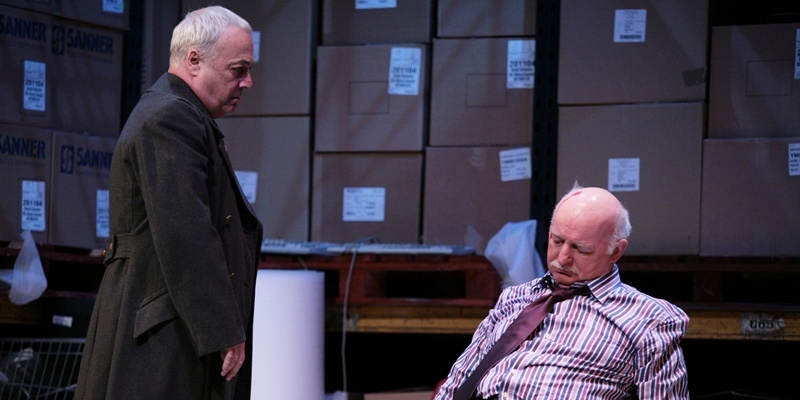Any theatre-goer who believes swearing is for people with a limited vocabulary should make an exception for Gagarin Way. Gregory Burke’s zippy breakthrough one-act play is a barrage of bad language from the word go but, after while, it becomes less conspicuous as we are sucked into his gritty, witty and sinister and black comedy.
The production, directed by Michael Emans, is touring as part of Rapture Theatre’s tenth anniversary programme, nine years after it was last staged in Scotland. Set in a Dunfermline computer factory in the present day, we meet Eddie (Jordan Young) and Tom (Finn Den Hertog) as they sit in a warehouse discussing the somewhat unlikely subject of 20th-century French writers Jean-Paul Sartre and Jean Genet, interspersed with a good dose of profanity, of course.
It’s clear from the outset that Eddie is a man with a troubled past, a chip on his shoulder, highly charged and impatient, yet impossibly well read. He tells the nervous security guard Tom it’s amazing what you can do with a library ticket.
Young is riveting as Eddie, as he talks the young politics graduate down while waiting for his mate Gary (Jimmy Chisholm) to arrive. As far as Tom knows, they are planning to steal some computer chips and, in return for his silence, he will get some cash. Then Gary appears carrying actor Dave Anderson (City Lights, Gregory’s Girl) unconscious, gagged and bound, and the plot takes a much darker turn.
Inspired by Black Watch playwright Burke’s time working on production lines in Fife factories, Gagarin Way is a politically charged drama in which the ideologies of men clash as they desperately try to find a way to effect change in the face of global capitalism. Eddie and Tom have got wind there is to be a visit from a company consultant and they decide to kidnap him, hoping he’ll be of value; Japanese or American someone influential.
As it turns out, Frank (Anderson) is an ex-Fifer who has since moved to Surrey and, although the men come to realise they share a history of mining relatives, in their eyes he is still the embodiment of capitalism.
There’s a strong background of socialism and communism in Fife, and the play is named after a street in the mining village of Lumphinnans which honours the Soviet cosmonaut Yuri Gagarin, who became the first man in space in 1961.
As the play unfolds, it becomes glaringly obvious neither Eddie nor Gary have any idea what point they are trying to make with the now botched kidnap, and panic sets in.
The play meditates on how men deal with the realisation they are powerless. Chisholm demonstrates this impeccably as he conveys the idealist Gary’s wish to fight for a noble socialist cause but, on the other hand, be pals with their victim. The only downside is we don’t learn much of Frank, who is merely a vehicle for the men’s beliefs. To them, he represents the enemy, but making him suffer may change very little.
Assuredly, he tells them to “get on with it” and, as the conversation takes an inevitable political slant, he interjects prophetic statements about how the Spanish turned on each other during the 1930s Civil War, or how Josef Stalin killed all his “friends”.
It’s clear neither kidnapper will be as lucky as Jean Genet and be absolved of any wrongdoing because they have high-ranking supporters like Sartre, Picasso or Jean Cocteau. Frank puts it simply, “You don’t live in revolutionary times.”
It’s a powerful and gripping 90 minutes, with each actor holding his own in what is a fairly stripped-down production. It has to be said that Young does outshine his counterparts, simply because his character is so intense and intriguing.
Written a decade ago, Emans says he had to change very little of the dialogue, as it remains relevant today political identity is continuing to weaken and workers are no longer a powerful entity. This may ring true here in the UK, where people are keeping their heads down, waiting for things to get better or worse just thankful while there is money to put food on the table.
At one time, striking or protesting might have brought about change, but the power of the unions has dwindled and being a worker means less than it once did. If we look at what’s been happening in Egypt and Libya of late, there is evidence revolution is still alive. But here, for now, it is the stuff of history books and Gagarin Way is testament to this.Jennifer Cosgrove saw Gagarin Way at the macrobert art centre in Stirling. It tours to Perth Theatre on March 4-5 and The Byre Theatre in St Andrews on March 12. More dates and info at www.rapturetheatre.co.uk
